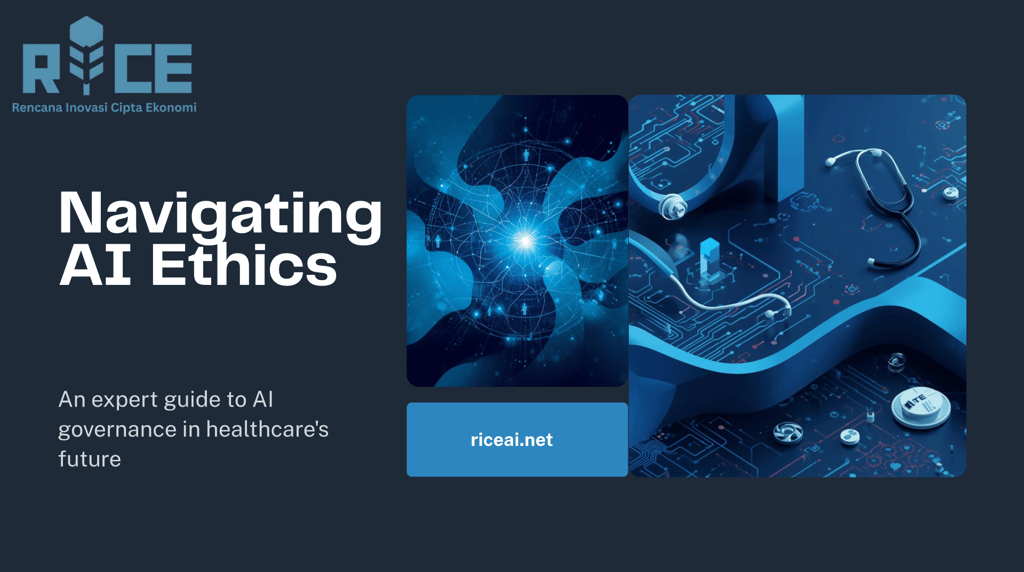Navigating the Ethical Frontier: An Expert's Guide to AI Governance in Healthcare's Future
This guide outlines core principles for robust AI governance, ensuring fairness, privacy, and trust for medicine's future.
INDUSTRIES
Rice AI (Ratna)
10/14/20256 min read


The future of healthcare is undeniably intertwined with artificial intelligence (AI). From revolutionizing diagnostics to personalizing treatment plans and streamlining operations, AI holds the potential to transform patient care as we know it. However, this profound promise comes with an equally profound responsibility: establishing robust ethical AI governance. Without clear frameworks, unchecked AI deployment risks exacerbating existing health inequities, compromising patient privacy, and eroding public trust. This guide delves into the critical challenges and foundational principles necessary to navigate AI's ethical frontier, ensuring its power is harnessed for good in healthcare.
AI's Promise and Peril in Medical Innovation
The rapid evolution of AI algorithms and computational power is already making significant inroads into medical practice. Understanding both its transformative capabilities and inherent risks is the first step towards responsible integration.
Unlocking Clinical Potential
AI is poised to revolutionize healthcare across numerous domains. In diagnostics, AI algorithms can analyze medical images with unprecedented speed and accuracy, aiding in the early detection of diseases like cancer or retinopathy. Personalized medicine benefits immensely, with AI modeling patient data to predict drug responses and tailor therapies for optimal outcomes. Furthermore, AI accelerates drug discovery by simulating molecular interactions, significantly reducing R&D timelines and costs. Tools like predictive analytics also enhance operational efficiency, optimizing hospital workflows and resource allocation, ultimately improving the patient journey.
The Shadow of Unchecked AI
Despite its immense potential, AI in healthcare presents serious ethical dilemmas if not properly governed. A primary concern is algorithmic bias, where AI models, trained on unrepresentative datasets, may produce inequitable outcomes for certain demographic groups. Patient privacy and data security are paramount, as AI systems often require access to highly sensitive personal health information, raising risks of breaches or misuse. Accountability remains a complex issue; when an AI makes a diagnostic error, determining who is responsible—the developer, the clinician, or the system itself—is not straightforward. The "black box" nature of many advanced AI models also poses a challenge, as their decision-making processes can be opaque, hindering trust and oversight.
Core Pillars of Ethical AI Governance in Healthcare
To mitigate risks and foster trust, healthcare organizations must build their AI strategies upon foundational ethical principles. These pillars ensure that technological advancement aligns with human values and patient well-being.
Transparency and Explainability
For AI to be trustworthy in healthcare, its operations cannot remain opaque. The "black box" problem, where an AI system provides an output without a clear explanation of its reasoning, is particularly problematic in clinical settings. Clinicians need to understand why an AI recommended a specific diagnosis or treatment to validate its output and ensure patient safety. Explainable AI (XAI) technologies are emerging to address this, offering insights into how AI models arrive at their conclusions. Implementing XAI is crucial for building confidence among medical professionals and patients, ensuring that AI acts as an assistant rather than an unquestioned authority.
Fairness and Bias Mitigation
AI models learn from the data they are fed, and if that data reflects historical biases or underrepresents certain populations, the AI will perpetuate and even amplify those biases. In healthcare, this can lead to serious disparities in diagnosis, treatment, and access to care. Addressing algorithmic bias requires proactive measures, including curating diverse and representative training datasets. Techniques such as adversarial training and regular fairness audits can help identify and mitigate biases before and after deployment. Prioritizing fairness ensures that AI-driven healthcare serves all patients equitably, promoting health equity rather than hindering it.
Privacy and Data Security
Healthcare data is among the most sensitive information a person possesses, making patient privacy and robust data security non-negotiable in AI integration. Compliance with stringent regulations like HIPAA in the United States and GDPR in Europe is a baseline, but organizations must go further. Advanced security measures are essential, including anonymization, pseudonymization, and differential privacy techniques to protect individual data points while still allowing for aggregate analysis. Emerging technologies like federated learning allow AI models to be trained on decentralized data without explicit data sharing, further enhancing privacy. Safeguarding patient data builds confidence and is fundamental to the ethical use of AI in medicine.
Operationalizing AI Governance: Frameworks and Best Practices
Establishing principles is only the first step; effective AI governance requires concrete frameworks and continuous operational practices. This ensures that ethical considerations are embedded throughout the AI lifecycle.
Multi-Stakeholder Collaboration
Effective AI governance in healthcare cannot be achieved in isolation. It demands a multi-stakeholder approach, bringing together a diverse group of experts. This includes clinicians who understand patient needs and clinical workflows, ethicists who can navigate complex moral dilemmas, technologists who grasp AI's capabilities and limitations, patients who provide invaluable lived experience, and regulators who ensure legal compliance. Creating interdisciplinary AI ethics committees within healthcare organizations is a critical step, fostering open dialogue and informed decision-making. Collaboration ensures that AI solutions are not just technologically advanced but also clinically relevant, ethically sound, and patient-centered.
Continuous Oversight and Auditing
AI models are not static; their performance can degrade over time due to data drift or changes in patient populations. Therefore, AI governance requires continuous oversight and rigorous auditing throughout the AI lifecycle, from development to deployment and beyond. Regular performance monitoring is essential to detect any unintended biases or inaccuracies that may emerge post-deployment. Impact assessments, similar to privacy impact assessments, should evaluate the ethical, social, and legal implications of AI systems before and after implementation. Post-deployment vigilance, including mechanisms for reporting adverse events related to AI, ensures ongoing safety and accountability.
Regulatory Evolution and Adaptability
The regulatory landscape for AI in healthcare is rapidly evolving, with new guidelines and laws constantly being proposed and enacted globally. Healthcare organizations leveraging AI must remain agile and adaptable, anticipating changes and integrating them into their governance frameworks proactively. This involves dedicated legal and compliance teams focused on AI regulations, ensuring that internal policies align with external requirements. Staying informed and flexible helps avoid compliance risks and ensures that AI initiatives remain on solid legal ground. At Rice AI, we constantly track these evolving landscapes to ensure our solutions are not only cutting-edge but also fully compliant and ethically sound, providing peace of mind for our partners.
Technological Innovations Driving Ethical AI Solutions
The development of AI for healthcare is not solely about creating powerful predictive models; it also encompasses building tools and methodologies that enhance the ethical integrity of these systems. Technology itself can be a powerful ally in navigating the ethical frontier.
AI in AI: Developing Tools for Governance
Intriguingly, AI can be leveraged to address some of its own ethical challenges. Researchers are developing AI-powered audit tools designed to automatically detect bias in datasets and algorithmic outputs, providing quantitative metrics for fairness. Machine learning techniques are also being applied to improve explainability, for instance, by generating human-interpretable summaries of complex model decisions. Privacy-preserving AI, which includes techniques like differential privacy and federated learning, uses cryptographic methods and statistical noise to protect individual data points during model training and inference. Synthetic data generation, another AI innovation, creates artificial datasets with the same statistical properties as real patient data but without any identifiable information, allowing for safe model development and testing. These innovations exemplify how technology can be a proactive force for good in ethical AI governance.
Trustworthy AI Design by Default
The most effective way to ensure ethical AI is to embed these considerations from the very outset of the development process. This approach, often termed "trustworthy AI design by default" or "ethics-by-design," means that principles such as privacy, fairness, security, and transparency are not afterthoughts but core requirements built into the architecture of every AI system. It necessitates a robust development lifecycle that includes comprehensive risk assessments, diverse stakeholder input, and rigorous validation and testing protocols specifically tailored to ethical benchmarks. This philosophy dictates that AI solutions should be inherently robust, reliable, and resistant to misuse. This philosophy is central to Rice AI's product development, where responsible AI design is ingrained in every phase, ensuring our partners benefit from inherently ethical and high-performing AI that they can confidently deploy in critical healthcare settings. By designing for trust, we lay the groundwork for AI solutions that genuinely enhance patient care and uphold medical integrity.
Shaping a Responsible Future for Healthcare AI
The journey to fully integrate AI into healthcare responsibly is complex, yet it is a journey we must undertake with foresight and unwavering commitment to ethical principles. AI's potential to revolutionize diagnostics, personalize treatments, and streamline operations is immense, promising a future where healthcare is more efficient, accessible, and effective. However, this transformative power can only be realized if we proactively address the inherent risks of bias, privacy breaches, and accountability gaps through robust governance.
Ethical AI governance is not merely a compliance burden; it is an enabling framework that fosters trust, ensures equitable outcomes, and unlocks the sustainable long-term value of AI in medicine. It demands a holistic approach, encompassing transparency, fairness, and unwavering dedication to patient privacy, all supported by continuous oversight and adaptable regulatory strategies. The collaborative efforts of clinicians, ethicists, technologists, and policymakers are crucial in shaping this future. Moreover, technological advancements in AI itself are providing new tools to detect bias, enhance explainability, and preserve privacy, illustrating that ethics and innovation can, and must, advance hand in hand.
The future of healthcare AI is not just about intelligence; it is about integrity. By designing, deploying, and governing AI systems with a deep understanding of their ethical implications, we can build a healthcare ecosystem that is not only technologically advanced but also profoundly human-centered. Responsible innovation will ensure that AI serves as a powerful ally in the pursuit of better health for all, upholding the highest standards of care and trust. As leaders in AI innovation, Rice AI is dedicated to advancing these conversations and providing the tools and expertise necessary to navigate this complex terrain responsibly. We believe the future of healthcare AI is not just about intelligence, but about integrity.
Join us in shaping this responsible future. Explore Rice AI's comprehensive resources on ethical AI development and governance, and discover how our solutions can help your organization harness the power of AI while upholding the highest standards of patient care and trust. Let's build a healthier, more ethical tomorrow, together.
#AIinHealthcare #EthicalAI #AIGovernance #HealthcareInnovation #FutureofMedicine #PatientCare #MedicalAI #ResponsibleAI #HealthTech #DigitalHealth #AIethics #HealthcareTechnology #PrivacyByDesign #FairnessInAI #RiceAI #DailyAIIndustry
RICE AI Consultant
To be the most trusted partner in digital transformation and AI innovation, helping organizations grow sustainably and create a better future.
Connect with us
Email: consultant@riceai.net
+62 822-2154-2090 (Marketing)
© 2025. All rights reserved.


+62 851-1748-1134 (Office)
IG: @riceai.consultant
